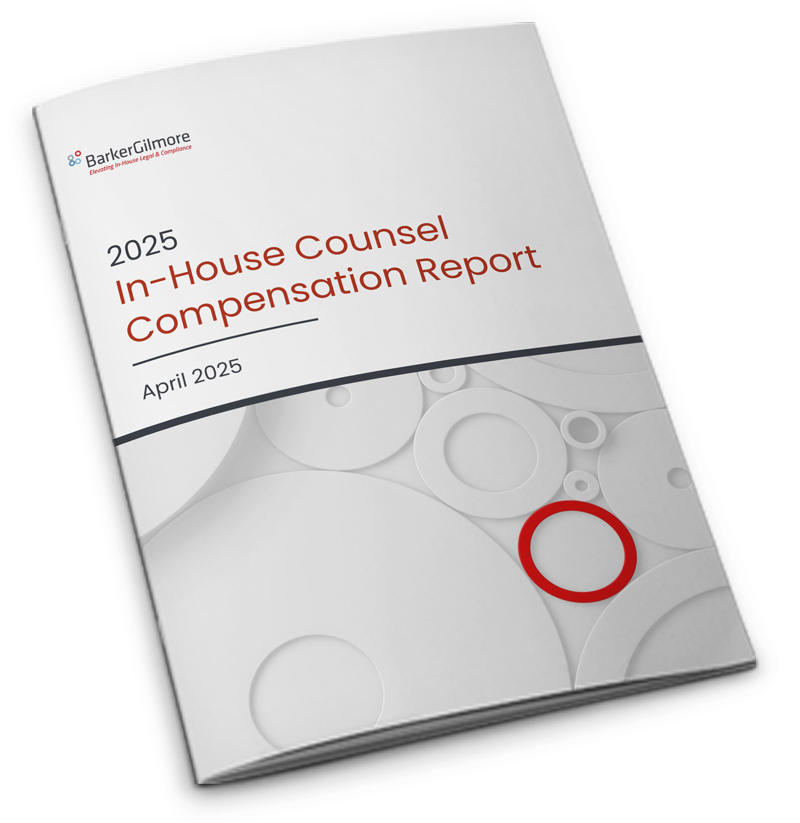Building Stronger Relationships with Boards
Working with a company’s Board of Directors can seem intimidating and challenging. Still, it’s also an opportunity for GCs to leverage their existing skills, shape and advance company initiatives, and strengthen relationships with colleagues and seasoned professionals. Plus, the exposure and networking can create pathways to one day join a board yourself.
In the GC AdvantageSM webinar, “How GCs Create Value in the Boardroom,” Cindie Jamison, who serves on the board of the ODP Corporation, Darden Restaurants, Inc., and Big Lots, Inc., and Laura Schumacher, BarkerGilmore Strategic Advisor and board member of General Dynamics and CrowdStrike, joined me to share their experience and insights on interacting with a company board in both the legal and non-legal space. They also suggested how GCs might stand out from the competition to secure a public company board seat. This article is a summary of our conversation.
9 Insights from Leading Executives on the Role of General Counsel Serving on a Board of Directors
Dramatic Changes and Heightened Stakes
Fifty years ago, boards were often stacked with cronies of the CEO who would rubber-stamp decisions, ignore unsavory findings, and make decisions behind closed doors. However, the dramatic changes shaped by shifting cultural, regulatory, and technical landscapes have made the conduct and actions of boards far more visible, yielding heightened expectations for transparency and accountability while inviting scrutiny from shareholders and the public. Laura notes that, in today’s climate, each board member must be prepared to explain the contributions, role, and value they bring to oversight of the company.
Soar at the Right Altitude
Given their time working with board members as a legal advisor, GCs may develop an interest in joining a board outside their company. However, it is critical to consider whether public company board work is the right fit. Burrowing into the process and daily operations are assets in a GC role, but not for the collaborative guidance of a board. Laura has noted a misconception that lawyers may be considered redundant to a company’s existing GC.
GCs joining boards should make it clear to the board and management they are not there to give actual legal advice; that is always the provenance of the GC of the company. As a corrective, Laura suggests highlighting the skills associated with legal work: anticipating obstacles, analyzing issues from multiple perspectives, and nimbly solving problems.
Cindie agrees that GCs bring valuable critical thinking to boards. During the interview process, she advises them to keep their answers and observations at a high level, focusing on facets of strategy beyond the restricted lens of legal risk. To improve their chances for selection, GCs should highlight their deep grounding in risk management and governance, which informs their aptitudes for strategic planning and crisis management.
Continue to Network for Opportunities
Laura’s on-ramp to the General Dynamics board arose from her time as a GC. In connection with her work on a then-pending organization/strategic transaction, Laura worked directly with the board, and in particular with a board member, who was impressed with her work and later approached her about a position on that company’s board.
Cindie’s board service also emerged from networking. As a partner in a crisis management firm, she received a call from a Colorado executive who had heard that she fit his board’s specific criteria: a financial expert who was also a mother to young children. The product was Horizon Organic, the dairy brand. Cindie’s recruitment was an early instance of giving the consumer a voice in the boardroom, now a common practice.
Find a Way into the Room
Cindie urges GCs to find opportunities to enter the boardroom to observe dynamics, clarify what is expected of board members, and participate in real-time conversation. One way to prepare for board service is to pursue an NACD certification, which presents real-life board scenarios and case studies for the test taker to analyze.
Laura suggests that GCs begin to spark conversations with colleagues that can prompt invitations into the boardroom, perhaps for a presentation or a project. Building expertise in topical issues—such as AI, environmental social and governance practices (ESG), or compensation committees—also enhances value to a board.
Boards Under Pressure Need Courage and Clarity
Recent crises with companies like Disney and Boeing have forced boards to contend with negative sentiments, performance issues, and other fallout. Even under pressure, Laura stresses, boards must maintain clear-eyed oversight of the CEO and understanding of organizational dynamics through mechanisms like culture surveys. Suppose a board appears to dismiss or disregard incriminating information. In that case, she suggests talking with the GC, likely a constant presence in the boardroom, to ensure that members receive unfiltered, frequent, and accurate data.
As a board member, she prioritizes candid discussions with management team members about organizational developments and how they feel about their positions. Negative findings or crises may require board leadership to step in, perhaps calling a series of executive sessions or enlisting executives or outside counsel for support.
Hot Topics from Hackers to Hostility
Within the broad risk category, Laura has noticed an intensified focus on cybersecurity due to proposed regulations and the heightened dangers that incidents pose to risk management. She explains that cursory updates from the CIO are no longer sufficient, as cybersecurity awareness now demands comprehensive discussions about threats, incidents, and strategic responses.
In her retail and consumer-based companies, Cindie senses concern about the consumer’s palpable uncertainty and anxiety in response to the fraught political and economic landscapes. Consumer behavior observations have prompted discussion among board members: What are they thinking? What are they feeling? And perhaps most critically, why aren’t they shopping?
Represent Stakeholders, Not Just Shareholders
Cindie notes that the challenges of COVID and its associated shortage of resources have instilled among board members an appreciation of employees, suppliers, and vendors—the vital ecosystem of a company. To that end, she hopes that boards expand their traditional membership pools to include more GCs and human resources officers to guide company policies such as remote work and support employee morale.
Laura agrees that boards have expanded their preoccupations beyond standard topics, such as succession planning, to reflect the increased recognition that company performance rests upon employee well-being and healthy employer-employee relationships.
Balance Brand Reputation and Company Performance
Greater transparency in business may lead to amplified reputational risk, which can trigger conflict and dissent in the boardroom. Cindie advises treading carefully across social issues and causes unless they are so germane to business that they require taking a stand.
For example, as Chair of the Tractor Supply board, she recalls emotionally charged conversations about whether its stores should carry firearms. Ultimately, the company decided not to, despite the specters of lost revenue and hostility from the core consumers of their rural demographic. Noting that one of Tractor Supply’s largest stores is in Uvalde, Texas, the site of a tragic school shooting, Cindie was relieved that the firearm was not purchased at Tractor Supply.
On the contrary, Tractor Supply was able to fund the funerals of each student victim. Cindie deems the experience harrowing yet instructive, as the company’s decision yielded a chance to help, not hurt. Although every situation is unique and complex, she advises taking each dilemma seriously and thinking carefully about actions and implications. After all, a short-term boost in revenue may lead to catastrophic events down the road.
Laura underscores the nuances of the board’s alliance with the management team and the CEO in evaluating reputational risks. Boards need to strike a delicate balance, she says, between dictating management’s actions on behalf of shareholders and supporting their decisions through keen observation. She finds reputational issues amongst boards’ thorniest issues to sort out. However, maintaining a strong, close, and candid relationship between the board and management helps tremendously when confronting complex reputational problems.
Build Stronger Board Relationships
To understand how to build stronger relationships with boards and create better value for the board or the CEO, please contact our team at BarkerGilmore. Our seasoned professionals offer insight into recruiting, leadership development, and legal and compliance department consulting services to benefit you and your organization.
Kristin Campbell, Laura Schumacher, and our team of professionals are happy to help accelerate the initiatives that you’re already pursuing or to supplement your current strategic thinking to help you realize your vision. Please reach out if you or your organization may benefit from our recruiting, leadership development and coaching, or legal and compliance department consulting services. Let BarkerGilmore help you build and optimize your legal and compliance departments.
Connect with a legal recruiting advisor
* indicates required fields




